 I realize that I am working on a nearly impossible task here. Trying to convince someone who thinks they don't want to watch The 100 that it's worth their time is incredibly difficult. What it seems to be from the outside is not what it is, but it spends just long enough as the bad version of itself to make most people stop watching it. When you do get through it, however, it is a kind of incredible little show that doesn't get nearly the love or conversation that it deserves. On a different network or with superficial genre changes, this would be a highly regarded show, but it's a Young Adult show on The CW, so people get a bad impression from the start.
I realize that I am working on a nearly impossible task here. Trying to convince someone who thinks they don't want to watch The 100 that it's worth their time is incredibly difficult. What it seems to be from the outside is not what it is, but it spends just long enough as the bad version of itself to make most people stop watching it. When you do get through it, however, it is a kind of incredible little show that doesn't get nearly the love or conversation that it deserves. On a different network or with superficial genre changes, this would be a highly regarded show, but it's a Young Adult show on The CW, so people get a bad impression from the start.Let's start there, looking at everything that is stacked against this show:
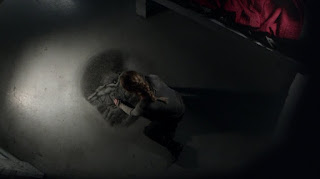 Overly derivative premise: Apologies for reading like a second generation ripoff of Young Adult Dystopian novels/movies: In the future, the Earth is so ravaged by radiation that humanity has had to abandon it. What's left is on The Ark, a space station in orbit around Earth, with only a few thousand people. All crimes are punishable by death, unless the person committing the crime is under 18, at which point they are imprisoned until they turn 18 and then are put on trial again, then either freed or executed. Running out of resources, The Ark sends 100 of those prisoners down to Earth to see if it would be possible to survive down there.
Overly derivative premise: Apologies for reading like a second generation ripoff of Young Adult Dystopian novels/movies: In the future, the Earth is so ravaged by radiation that humanity has had to abandon it. What's left is on The Ark, a space station in orbit around Earth, with only a few thousand people. All crimes are punishable by death, unless the person committing the crime is under 18, at which point they are imprisoned until they turn 18 and then are put on trial again, then either freed or executed. Running out of resources, The Ark sends 100 of those prisoners down to Earth to see if it would be possible to survive down there. 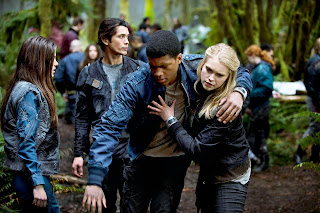 The pilot: If you presented me with the premise of this show and told me it was on The CW about 5 years ago, I would have predicted that the pilot looked exactly like it does here. It's the bad version of the pilot that I would have feared. It starts with a world-building exposition dump, then once it gets down to Earth, it plays out as an immature version of Lord of the Flies, with some teen drama thrown in for good measure.
The pilot: If you presented me with the premise of this show and told me it was on The CW about 5 years ago, I would have predicted that the pilot looked exactly like it does here. It's the bad version of the pilot that I would have feared. It starts with a world-building exposition dump, then once it gets down to Earth, it plays out as an immature version of Lord of the Flies, with some teen drama thrown in for good measure. The production company: The 100 was developed and is produced by Alloy Entertainment, from an idea that they created in-house, then later contracted a book series for in order to build up more buzz for the TV series. Alloy is best known for Gossip Girl, Pretty Little Liars, The Vampire Diaries, and The Originals, none of which are shows that I have interest in and all of which suggest it would be closer to the teen drama end of the scale.
The production company: The 100 was developed and is produced by Alloy Entertainment, from an idea that they created in-house, then later contracted a book series for in order to build up more buzz for the TV series. Alloy is best known for Gossip Girl, Pretty Little Liars, The Vampire Diaries, and The Originals, none of which are shows that I have interest in and all of which suggest it would be closer to the teen drama end of the scale. 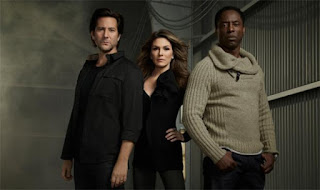 Not just about the kids: It's easy to put teenagers in the center of the show, and focus on them to the exclusion of everything else. It'd be especially easy for this show, with the fact that all of the kids we're following are convicted as criminals and were imprisoned, before being sent down to Earth to see if it's habitable, essentially treating them like they're expendable. Instead, as it goes on, the adults are just as much a part of the story as the kids are. They are integrated into stories, not just having a storyline that follows the kids then one that follows the adults, but storylines that integrate the two groups, making for much larger and more interesting stories, and forcing them to do more than the easy teen drama that could come out of the premise.
Not just about the kids: It's easy to put teenagers in the center of the show, and focus on them to the exclusion of everything else. It'd be especially easy for this show, with the fact that all of the kids we're following are convicted as criminals and were imprisoned, before being sent down to Earth to see if it's habitable, essentially treating them like they're expendable. Instead, as it goes on, the adults are just as much a part of the story as the kids are. They are integrated into stories, not just having a storyline that follows the kids then one that follows the adults, but storylines that integrate the two groups, making for much larger and more interesting stories, and forcing them to do more than the easy teen drama that could come out of the premise. 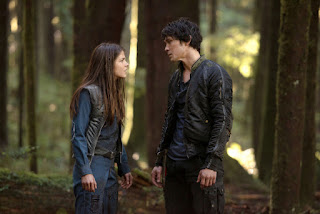 Willingness to abandon things that don't work: I complained about the pilot before, and there are some specific characters that stick out there as flat. We have Bellamy, the boring anarchist, his sister Octavia, Ms. Fanservice, and Kane, a ruthless, power-hungry politician back up on The Ark. By the halfway point of the season, these characters are far more interesting and fleshed out, due to a willingness to change the direction of their story or even flat out drop where they started, rather than stick to it out of stubbornness.
Willingness to abandon things that don't work: I complained about the pilot before, and there are some specific characters that stick out there as flat. We have Bellamy, the boring anarchist, his sister Octavia, Ms. Fanservice, and Kane, a ruthless, power-hungry politician back up on The Ark. By the halfway point of the season, these characters are far more interesting and fleshed out, due to a willingness to change the direction of their story or even flat out drop where they started, rather than stick to it out of stubbornness.  Commitment to pushing their ideas as far as they'll go: This point and the last might seem contradictory. The previous one is about making changes from where they started, to not keep going down the wrong path because they started that way. As it goes on and they course corrected, they start going in the direction of big ideas in the story. The biggest, and what turns into the idea that saves the show, is that the people on The Ark were wrong, and there are still people on Earth. The Grounders, as they're called, are people who survived the nuclear apocalypse, and like I said with the ensemble, they're not just there as set dressing, but a fully fleshed out world that gives them a lot of room to play around with big ideas. Once they find those ideas, they jump in headfirst and start pushing those as far as they can go, taking a surprisingly mature approach to a lot of tricky subjects.
Commitment to pushing their ideas as far as they'll go: This point and the last might seem contradictory. The previous one is about making changes from where they started, to not keep going down the wrong path because they started that way. As it goes on and they course corrected, they start going in the direction of big ideas in the story. The biggest, and what turns into the idea that saves the show, is that the people on The Ark were wrong, and there are still people on Earth. The Grounders, as they're called, are people who survived the nuclear apocalypse, and like I said with the ensemble, they're not just there as set dressing, but a fully fleshed out world that gives them a lot of room to play around with big ideas. Once they find those ideas, they jump in headfirst and start pushing those as far as they can go, taking a surprisingly mature approach to a lot of tricky subjects. 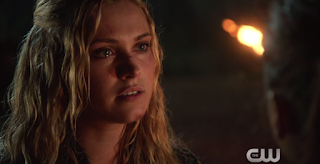 The big problem here is that I knew a lot of this going in to the show. I'd seen some writing about how far they're willing to go into moral gray areas, and comparisons to some of the best TV shows in recent memory. I watched multiple episodes, and was still unconvinced for a while. There are specific episodes that are turning points, and while there's not a single episode where it switches completely, there are places I can point to and definitely say this is where we started to see what they were capable of.
The big problem here is that I knew a lot of this going in to the show. I'd seen some writing about how far they're willing to go into moral gray areas, and comparisons to some of the best TV shows in recent memory. I watched multiple episodes, and was still unconvinced for a while. There are specific episodes that are turning points, and while there's not a single episode where it switches completely, there are places I can point to and definitely say this is where we started to see what they were capable of.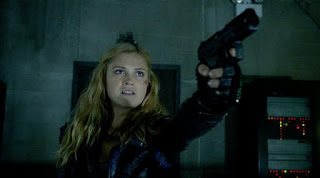 I'm going to not talk much about season 2. It is where the show knows exactly what it is and can do everything that it is capable of. It is also a minefield of possibly spoiling things and moments that are probably best unspoiled, so I will just say this: the show is at its absolute best in episodes 8 and 16 of season 2. What I can more comfortably talk about is in Season 1:
I'm going to not talk much about season 2. It is where the show knows exactly what it is and can do everything that it is capable of. It is also a minefield of possibly spoiling things and moments that are probably best unspoiled, so I will just say this: the show is at its absolute best in episodes 8 and 16 of season 2. What I can more comfortably talk about is in Season 1: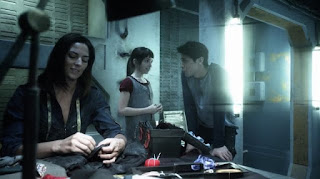 Season 1, Episode 6 - "His Sister's Keeper": In the pilot, Bellamy and Octavia are the characters that I felt were going to be trouble. The pilot flew past the interesting information about them too quickly for me to really process, so I didn't realize that there was more to them. Over the course of this episode, it flashes back to them on The Ark, showing them growing up, and suddenly giving them a lot of depth. Families on The Ark were limited to one child, so Octavia even being born was against the law. They had to keep her secret, hiding under a panel on the floor any time someone came to their living quarters. She was never allowed outside, for obvious reasons, and Bellamy hated her for the stress and everything that she added to their lives. When she's eventually caught, she's imprisoned with everyone else, and Bellamy blames himself for not doing better. When he finds out that prisoners are being sent to Earth, he goes as far as to attempt to kill Chancellor Jaha, the leader of The Ark, in order to be given the opportunity to go down to Earth and have a second chance to protect her. I go into so much detail to show what work they do, that with all of this information, they go from two of the most problematic characters in the show to possibly the most interesting, in just a single episode.
Season 1, Episode 6 - "His Sister's Keeper": In the pilot, Bellamy and Octavia are the characters that I felt were going to be trouble. The pilot flew past the interesting information about them too quickly for me to really process, so I didn't realize that there was more to them. Over the course of this episode, it flashes back to them on The Ark, showing them growing up, and suddenly giving them a lot of depth. Families on The Ark were limited to one child, so Octavia even being born was against the law. They had to keep her secret, hiding under a panel on the floor any time someone came to their living quarters. She was never allowed outside, for obvious reasons, and Bellamy hated her for the stress and everything that she added to their lives. When she's eventually caught, she's imprisoned with everyone else, and Bellamy blames himself for not doing better. When he finds out that prisoners are being sent to Earth, he goes as far as to attempt to kill Chancellor Jaha, the leader of The Ark, in order to be given the opportunity to go down to Earth and have a second chance to protect her. I go into so much detail to show what work they do, that with all of this information, they go from two of the most problematic characters in the show to possibly the most interesting, in just a single episode.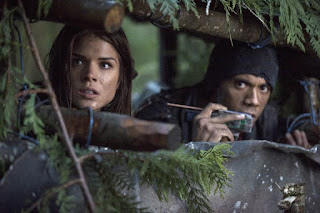 Season 1, Episode 13 - "We Are Grounders Part 2": With this episode, the show abandons its original premise. Instead of just being about the 100 trying to survive, it's now about them and their conflicts with the grounders. They're trying to avoid or win a war, and this episode is where they go into the moral gray areas they absolutely love going into with them. Up on The Ark they've already dealt with some really gray areas, but they're also pushing things further there with the lack of resources, as they start to become more severe. You can probably guess where their story goes from there. The ending of the episode is a little cheap, starting a brand new storyline in the last minute that is nowhere near a satisfying ending, as well as leaving the fate of a couple main characters completely up in the air, but those are small complaints compared to what the finale did right.
Season 1, Episode 13 - "We Are Grounders Part 2": With this episode, the show abandons its original premise. Instead of just being about the 100 trying to survive, it's now about them and their conflicts with the grounders. They're trying to avoid or win a war, and this episode is where they go into the moral gray areas they absolutely love going into with them. Up on The Ark they've already dealt with some really gray areas, but they're also pushing things further there with the lack of resources, as they start to become more severe. You can probably guess where their story goes from there. The ending of the episode is a little cheap, starting a brand new storyline in the last minute that is nowhere near a satisfying ending, as well as leaving the fate of a couple main characters completely up in the air, but those are small complaints compared to what the finale did right. 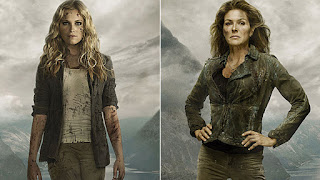 The show really reaches its peak (so far) in the second season, but these are where the show really shines in the first season. It's also testament to how much is in here that I have barely made specific mention of Clarke, the protagonist, or her mother Abby, who is also central to a lot of storylines. Early on, most of the good comes from characters that are a little more to the side. It takes most of the second season for Clarke to go from "Why isn't someone else the lead?" to "Oh, that's why", so it's much harder to talk about her and why she's such an interesting character later. I've also barely mentioned Kane going from uninteresting villain to possibly the most moral and conflicted character on the show, though a lot of that comes from just dropping that characterization and mostly pretending it never happened. I also neglected to mention John Murphy, a favorite of mine who avoids almost every single person in the cast trying to kill him and eventually turning into the voice of reason in a world gone completely mad. All of this also omits Monty, Jasper, Raven, Anya, Lexa, Lincoln, Indra, Dante, Cage, and Maya, all characters of great importance, but there is simply too much to try and fit it all in.
The show really reaches its peak (so far) in the second season, but these are where the show really shines in the first season. It's also testament to how much is in here that I have barely made specific mention of Clarke, the protagonist, or her mother Abby, who is also central to a lot of storylines. Early on, most of the good comes from characters that are a little more to the side. It takes most of the second season for Clarke to go from "Why isn't someone else the lead?" to "Oh, that's why", so it's much harder to talk about her and why she's such an interesting character later. I've also barely mentioned Kane going from uninteresting villain to possibly the most moral and conflicted character on the show, though a lot of that comes from just dropping that characterization and mostly pretending it never happened. I also neglected to mention John Murphy, a favorite of mine who avoids almost every single person in the cast trying to kill him and eventually turning into the voice of reason in a world gone completely mad. All of this also omits Monty, Jasper, Raven, Anya, Lexa, Lincoln, Indra, Dante, Cage, and Maya, all characters of great importance, but there is simply too much to try and fit it all in.Not all of the show is great, and there are some weak points. There are a few that are generally agreed upon, but even then they are turned into parts of the story that are generally seen as a positive influence, if not outright positive themselves.
 Moses storyline: No, it's not actually about Moses. In season 2, there is a storyline in which one of the characters goes off on a trek through the desert, taking some followers with him on a journey. No one with him knows where they're going or what the goal really is. A lot of fans hated it because it seemed to come out of nowhere, go on forever without a purpose, and was a strange break in the tension in the rest of the story. Most of that was the reason I liked it, showing one of the characters basically going completely insane and providing a break in what was otherwise usually an overwhelming tension from the rest of the story. When it finally comes to its conclusion, it starts a storyline that is going to be one of the focal points of season 3, so even then it ends up with a real purpose in the story.
Moses storyline: No, it's not actually about Moses. In season 2, there is a storyline in which one of the characters goes off on a trek through the desert, taking some followers with him on a journey. No one with him knows where they're going or what the goal really is. A lot of fans hated it because it seemed to come out of nowhere, go on forever without a purpose, and was a strange break in the tension in the rest of the story. Most of that was the reason I liked it, showing one of the characters basically going completely insane and providing a break in what was otherwise usually an overwhelming tension from the rest of the story. When it finally comes to its conclusion, it starts a storyline that is going to be one of the focal points of season 3, so even then it ends up with a real purpose in the story. 
Brief footnote: Yes, I am aware of Devin Faraci's article on exactly this topic, which is a monumental case of bad timing. This was finished but not yet published before his article was, though now I'm really glad I cut my own Battlestar Galactica reference from the end of this article.

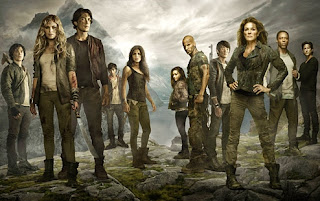
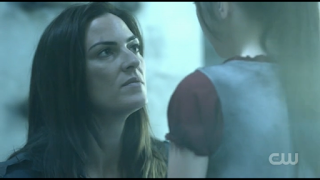

No comments:
Post a Comment